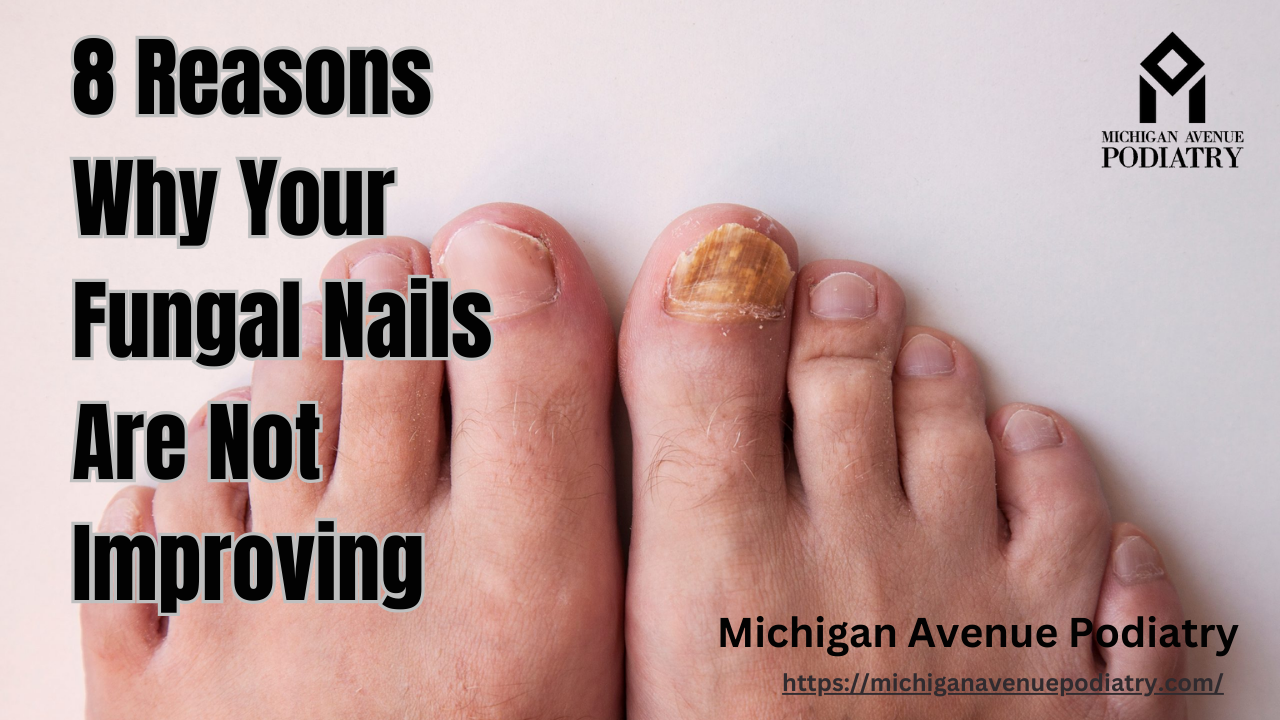Dealing with fungal nails can be frustrating and challenging. Despite trying various treatments, you may find that your fungal nails are not improving as expected. In this informative blog post, we’ll delve into eight common reasons why fungal nails may persist and provide expert insights from podiatrists on effective treatment approaches.
- Inadequate Treatment Duration: Fungal nail infections require consistent and prolonged treatment to achieve optimal results. Skipping doses or discontinuing fungal nail treatment prematurely can allow the fungus to persist and spread. Podiatrists recommend following the prescribed treatment regimen diligently for the recommended duration.
- Incorrect Diagnosis: Not all nail abnormalities are caused by fungal infections. Other conditions, such as psoriasis or trauma, can mimic the symptoms of fungal nails. Consulting a podiatrist for an accurate diagnosis is crucial to ensure appropriate treatment.
- Poor Treatment Adherence: Consistency is key when it comes to treating fungal nails. Failure to apply topical antifungal medications or take oral medications as directed can hinder treatment efficacy. Podiatrists emphasize the importance of adhering to treatment protocols to maximize effectiveness.
- Insufficient Nail Penetration: Topical antifungal medications may not penetrate the nail plate adequately to reach the underlying fungal infection. Podiatrists may recommend strategies to enhance nail penetration, such as thinning the nail or using specialized nail lacquers.
- Concurrent Health Conditions: Certain health conditions, such as diabetes or immune disorders, can compromise the body’s ability to fight fungal infections. Podiatrists may tailor treatment approaches to address underlying health concerns and optimize treatment outcomes.
- Environmental Factors: Fungal organisms thrive in warm, moist environments. Prolonged exposure to damp conditions, such as sweaty shoes or communal showers, can contribute to persistent fungal nail infections. Podiatrists may recommend lifestyle modifications to minimize exposure to fungal sources.
- Reinfection: Even after successful treatment, fungal nail infections can recur if preventive measures are not taken. Podiatrists advise implementing proper foot hygiene practices, wearing breathable footwear, and avoiding shared items to prevent reinfection.
- Underlying Nail Damage: Severe fungal nail infections can cause irreversible damage to the nail structure, making it challenging for new, healthy nails to grow. In such cases, podiatrists may recommend adjunctive treatments to promote nail regeneration or cosmetic interventions to improve nail appearance.
Conclusion: Persistent fungal nails can be a frustrating condition, but with the guidance of expert podiatrists, effective treatment is within reach. By addressing the underlying causes and implementing comprehensive treatment strategies, individuals can achieve clearer, healthier nails. If you’re struggling with fungal nails that are not improving, consult a podiatrist for personalized evaluation and treatment recommendations tailored to your needs. Don’t let fungal nails hold you back—take proactive steps towards healthier, happier feet today!



